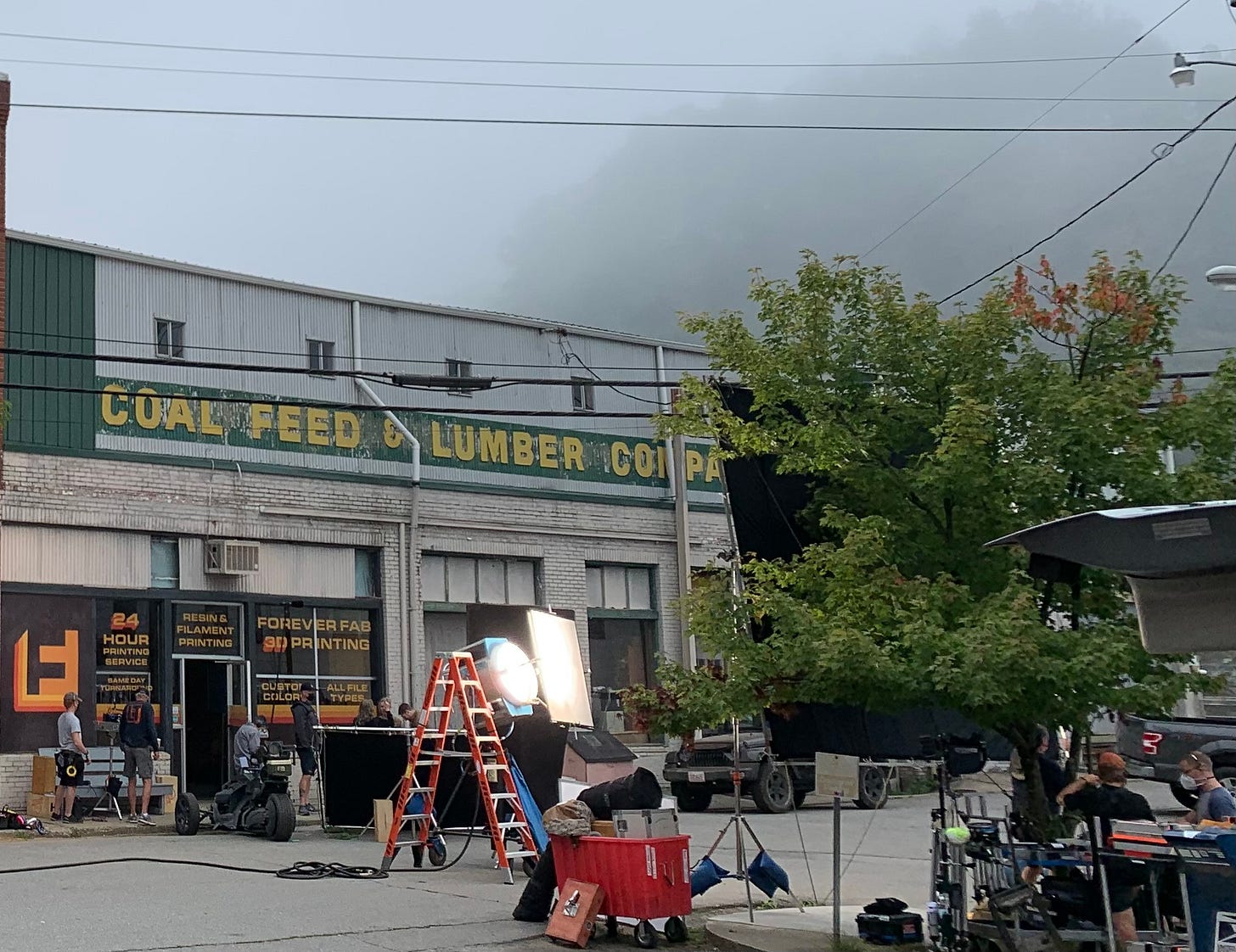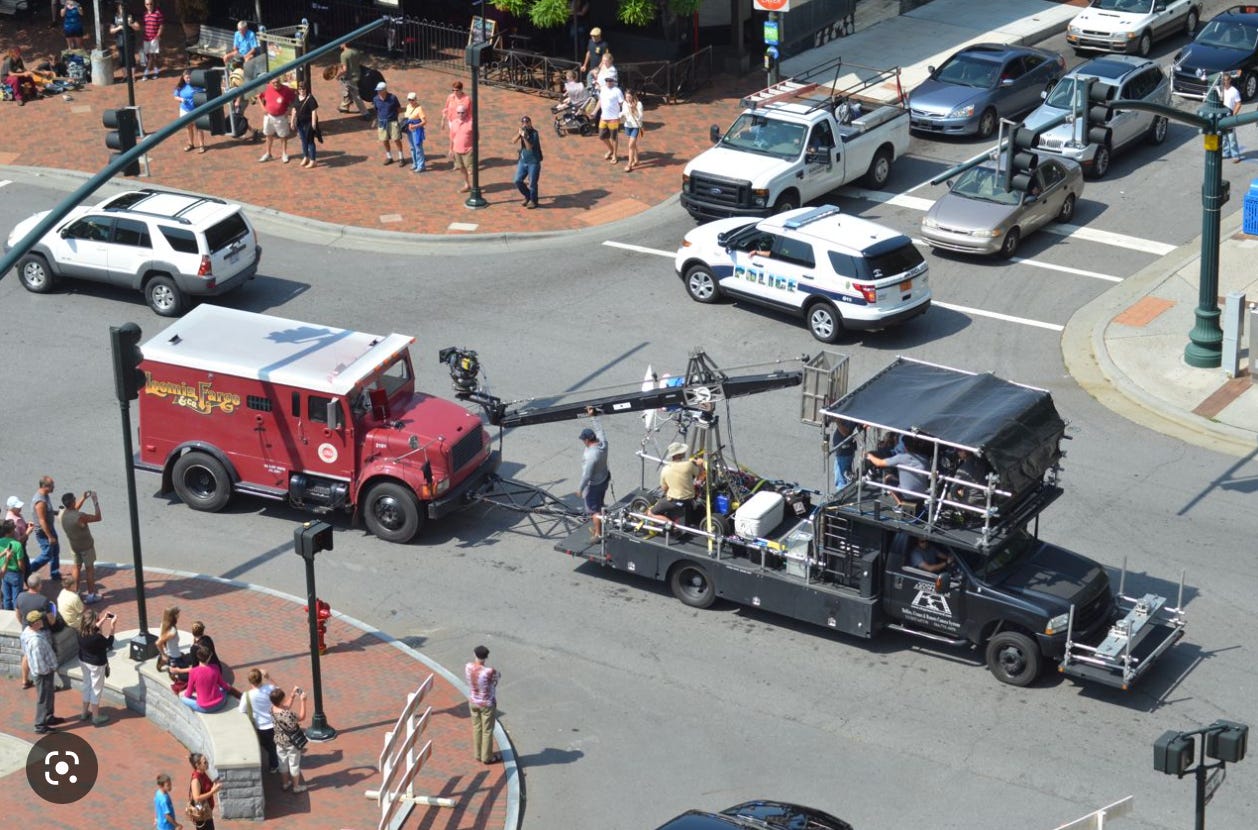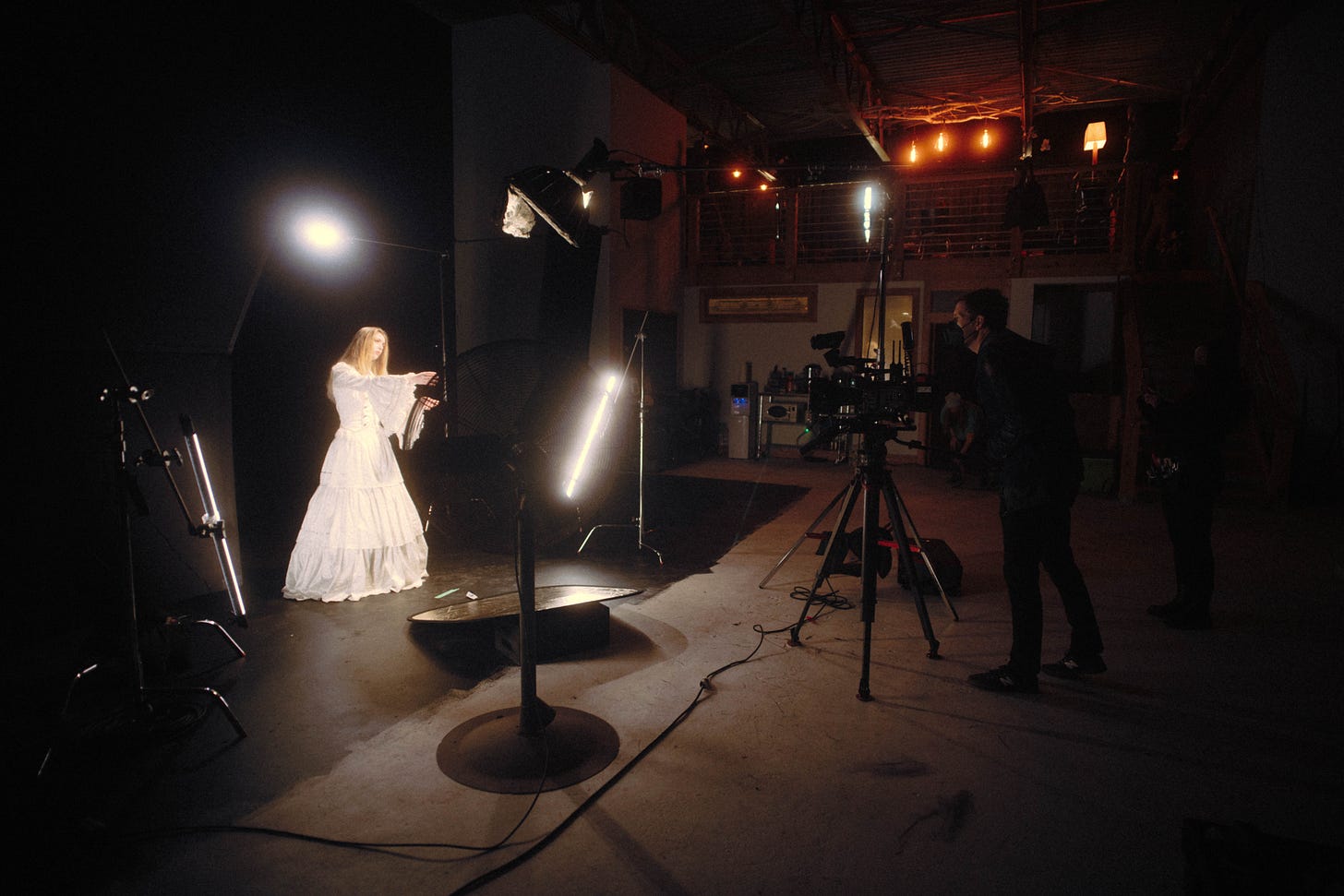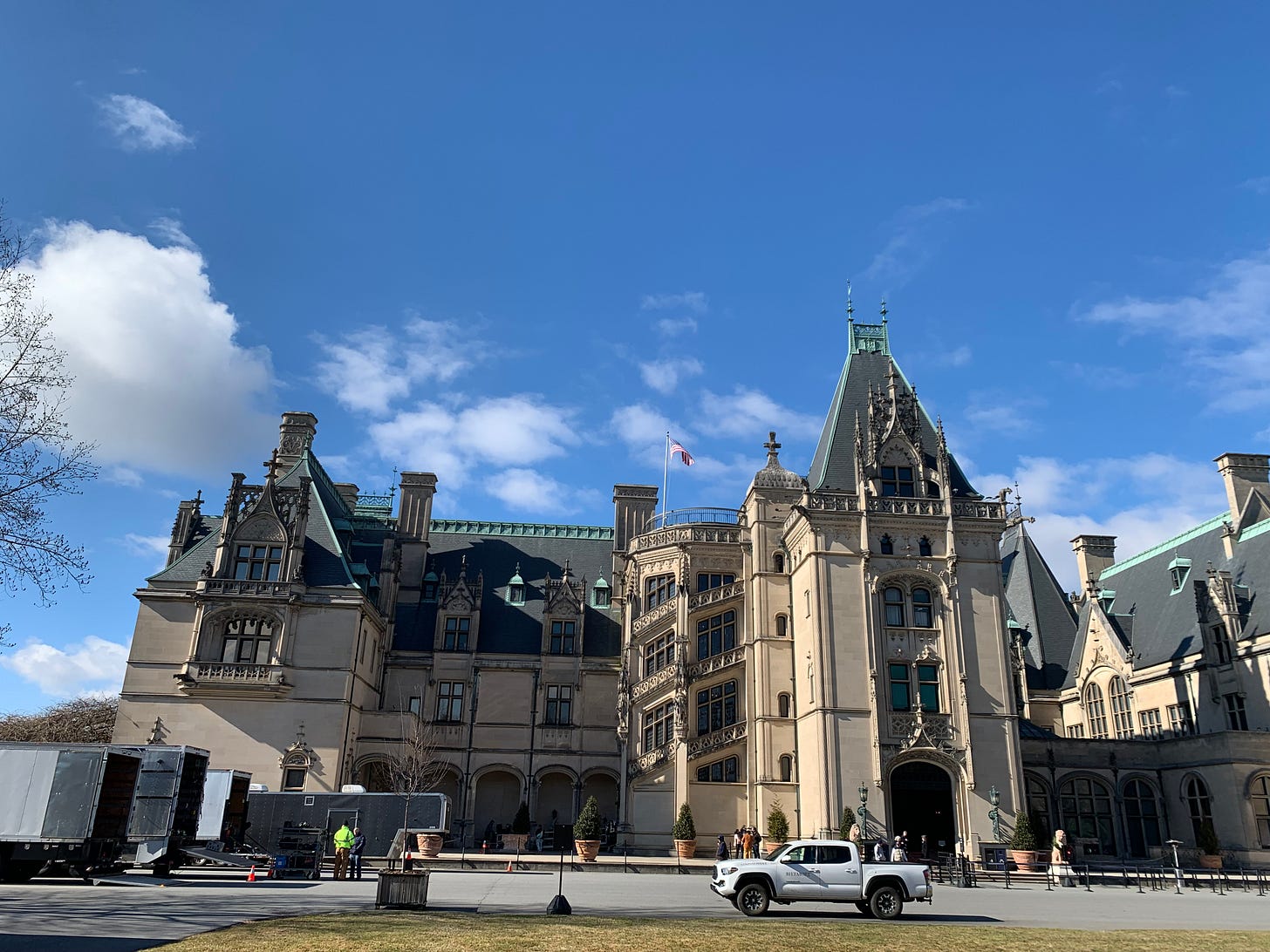New movie in the mountains: Diane Keaton, Kathy Bates, Alfre Woodard, Eugene Levy, more to film in Western North Carolina this spring; also, Ride High Studios opens in Alexander
It's showtime in N.C. as film industry surges; what's next for incentives?

This story sponsored by Citizens Fuel Co., a family-owned Asheville company.
I hope everyone is having a chance for a little spring break this week. Whether you mark Passover or Easter or the full (pink) moon this week, I hope it is renewing. Here’s a gentle reminder that your paid subscriptions ($75 a year, or $7 a month) sustain me and my family in this third year of the Hot Sheet newsletter project. Thank you to everyone who has paid for a subscription or a sponsorship. Your support has been incredible.

Before diving head-long into mountain movie-making, it’s always fun to reminisce about what a great tradition of filmmaking we’ve enjoyed in Asheville and Western North Carolina over the years. There have been big productions shot at the Biltmore Estate such as Being There starring Peter Sellers and The Swan featuring Alec Guinness and Grace Kelly. We’ll never forget the smash hit Dirty Dancing starring Patrick Swayze and Jennifer Grey, filmed in part at Lake Lure. Last of the Mohicans with Daniel Day-Lewis and Madeleine Stowe forever captured stunning scenery at Chimney Rock State Park. The based-on-a-true-North-Carolina-crime Masterminds showcased the comedy chops of Zach Galifianakis, Kristen Wiig, Owen Wilson, Kate McKinnon, Jason Sudeikis and Leslie Jones and was filmed around downtown Asheville (and many other locations). Remember Three Billboards Outside Ebbing, Missouri, which brought Francis McDormand, Sam Rockwell, Woody Harrelson and Peter Dinklage to downtown Sylva and other locations? Or The Hunger Games, starring Jennifer Lawrence, Liam Hemsworth, Josh Hutcherson and more, filmed in lush woods of DuPont State Forest and other locations? And so many more…
So what’s next?
Diane Keaton, Kathy Bates, Alfre Woodard, Beverly D’Angelo, Nicole Richie and Eugene Levy are a few of the stars set to film a new Hollywood production in Western North Carolina this month and next (I’ve been told they’ll be filming in the Hendersonville area). The movie-making comes fresh on the heels of a month-long Hallmark movie shoot back in January that was based at the Biltmore Estate. The glitz is part of a surging number of productions landing here, and across North Carolina.
This year’s action follows a great 2022, which ranked as the sixth-best for filmmaker spending (movies, television, commercial work) in the state - $258 million - since 2000, when the state started offering incentives, according to Gov. Roy Cooper, the N.C. Department of Commerce Secretary Machalle Baker Sanders and Guy Gaster, director of the N.C. Film Office, who issued a press release earlier this year touting the industry’s economic impact.
Wilmington often gets most of the movie-making attention in North Carolina because of the sprawling movie studio that film producer Agostino "Dino" De Laurentiis opened there in 1985. But the jobs, related spending and exposure all make filmmaking in the mountains big business. The potential for those big payoffs also inevitably triggers a debate about whether state lawmakers should use taxpayer money to lure more productions to N.C. Here’s a deeper look.
Summer campers comes to town
An independent comedy titled Summer Camp is set to start filming in WNC this month. The ensemble, as mentioned earlier, includes Diane Keaton, Cathy Bates, Alfre Woodard, Beverly D’Angelo, Nicole Richie and Eugene Levy, as well as Dennis Haysbert, Josh Peck, Tom Wright and Betsy Sodaro, according to reporting by Deadline.
That’s some big-time star power for writer-director Castille Landon, who will tell the story of childhood best friends Nora, Ginny and Mary, who spent their summers together at sleep-away camp. The trio lost touch over the years, but when they have a chance for a summer camp reunion, they all take it, Deadline reports. “We hit on this idea, pitched it to Diane, who loved it, and set out to cast legendary actors that have always wanted to work together, and I couldn’t be more excited,” Landon told Deadline.
Want to be a part of the big screen magic? Here’s the open casting call for extras.
Summer camps have long been part of the fabric of life in WNC. And summer camp movies are not new for Hendersonville. Way back in the 1990s, a young writer and aspiring director named Judd Apatow co-wrote his first movie, called Heavyweights.
The Disney cult classic is set at a camp (Camp Hope) for overweight kids that is taken over by a fitness entrepreneur as it's campers work to overthrow him. "We shot at Camp Pinnacle in Hendersonville North Carolina in 1994,” Apatow told People last year as he shared some behind-the-scenes photos of the production. “When it came out it didn't make any noise, but oddly it seems like tons of people have seen it and enjoy it.”
N.C.’s big 2022
As this year’s productions keep coming, state officials made sure to spotlight the film industry’s big spending in North Carolina last year mentioned above. Those productions created 16,000 jobs, including 3,000 from a skilled production workforce, they added in a March 10 press release.
With five productions currently underway in the state, including Summer Camp, state officials clearly want to keep the momentum going. Those productions will generate an estimated $98.5 million and bring in some 9,700 jobs, they said. “These projects not only provide thousands of job opportunities for our talented workforce,” N.C. Commerce Secretary Machelle Baker Sanders said in the release, “but they also support the small business communities surrounding every production set, positively impacting the local economies where they film.”

I recently met with Scott McKibben, one of those skilled film production workers, at his new studio in Alexander. Ride High Productions, a full service production company and studio, opened earlier this year at Fall Out Art Space. The location is a former school built in the 1920s and shuttered in the late 1980s. For about the past dozen years or so, the school campus has been re-envisioned as a small campus/community for artists in search of affordable studio space. A 2019 fire was a setback, but a small band of artists are still making their way there.
McKibben, a director of photography, has worked on everything from Netflix’s 28 Days Haunted to the Discovery Plus reality dating show Love Off the Grid to Live from Blackalachia, Asheville area musician Moses Sumney's feature-length film. Aside from the work, part of the studio’s purpose is to help build community among local film industry workers, McKibben told me. (The N.C. Film Office has 331 people in its crew listing for Western North Carolina.) It reminds of the days when Blue Ridge Motion Pictures opened its studio in 2001 in the East Asheville complex that is now home to Highland Brewing. The studio had about an eight-year run before closing.
Incentives

Any discussion of movie-making in North Carolina eventually turns to the use of state incentives, which have ebbed and flowed over the past 15 years. A bill filed earlier this month in the N.C. General Assembly would change the state’s current film and entertainment grant program, the latest in a rafter of changes over the years.
But first, some history. As mentioned earlier, the state started offering tax credits to film productions in 2000. A significant turning point came in 2010 when Gov. Beverly Perdue signed into law a lucrative 25 percent film tax credit not to exceed $20 million a project, with productions required to have more than $250,000 in expenses to qualify. That was reported by Port City Daily earlier this month as part of a story on a bill filed this year in the General Assembly that would change the states film grant program yet again. (In 2011 The Hunger Games was filmed in Transylvania County.)
That Perdue program ended in 2014 with state lawmakers replacing the incentive package with a $10 million competitive grant program. It had a $5 million cap per production. In 2015, the General Assembly tripled that pot of money.
In addition, state lawmakers have gradually lowered the minimum amount that productions must spend for qualifying expenses. In 2018, it went from $5 million to $3 million for feature-length films, $1 million an episode for a TV series, and $1 million for made-for-TV movies, a then new category, according to Port City Daily. By 2021 production companies were required to spend at least $1.5 million on films slated for theatrical viewing and $500,000 for a made-for-TV movie. A TV series had to put forth at least $500,000 per episode, with commercials bankrolling $250,000 to receive incentives. These changes all come as more and more content is made for television streaming services, Port City Daily notes.
Not everyone is a fan of film incentives. The Carolina Journal, a publication of the North Carolina-based conservative think tank the John Locke Foundation, had this to say in a March 12 piece arguing that film productions have long come to the Tar Heel state for its skilled workforce and natural beauty, regardless of incentives:
“So, while films like ‘A Biltmore Christmas,’ filmed at The Biltmore and approved for a grant up to $1,087,500, will be exciting to see on the Hallmark Channel’s ‘Countdown to Christmas’ later this year, many still make the point that numerous film and TV productions still want to come to the Old North State, the true star of the show, with or without incentives.”
Thanks for reading,
-j




